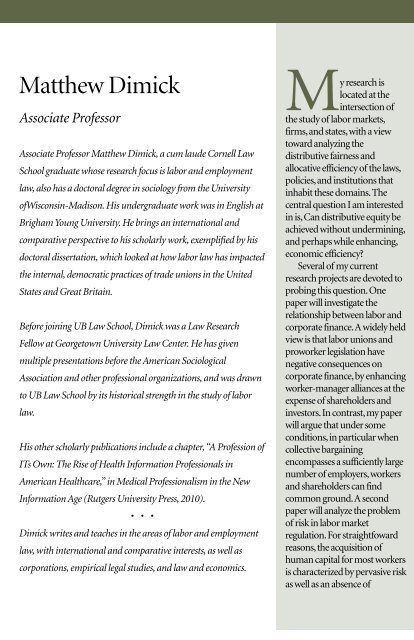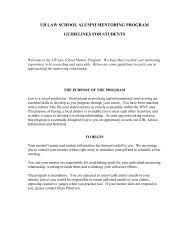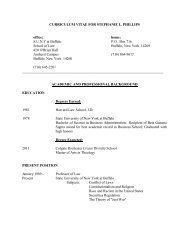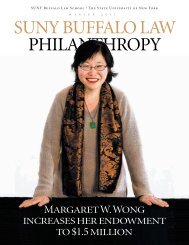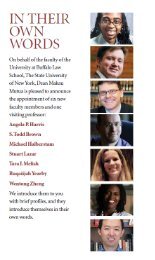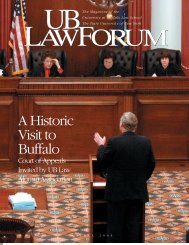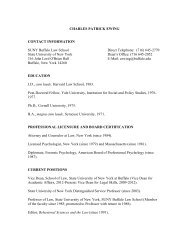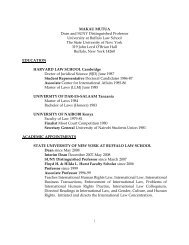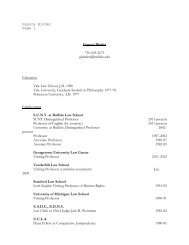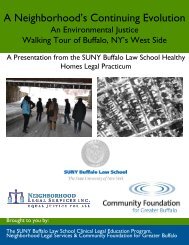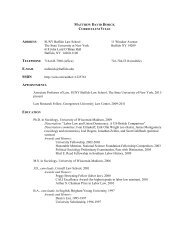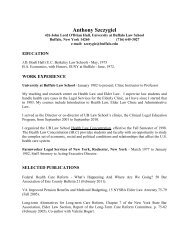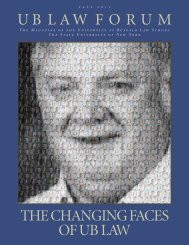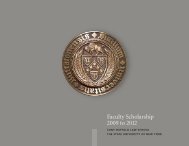Introducing Kim Diana Connolly, Samantha Barbas, Matthew Dimick ...
Introducing Kim Diana Connolly, Samantha Barbas, Matthew Dimick ...
Introducing Kim Diana Connolly, Samantha Barbas, Matthew Dimick ...
You also want an ePaper? Increase the reach of your titles
YUMPU automatically turns print PDFs into web optimized ePapers that Google loves.
<strong>Matthew</strong> <strong>Dimick</strong><br />
Associate Professor<br />
Associate Professor <strong>Matthew</strong> <strong>Dimick</strong>, a cum laude Cornell Law<br />
School graduate whose research focus is labor and employment<br />
law, also has a doctoral degree in sociology from the University<br />
ofWisconsin-Madison. His undergraduate work was in English at<br />
Brigham Young University. He brings an international and<br />
comparative perspective to his scholarly work, exemplified by his<br />
doctoral dissertation, which looked at how labor law has impacted<br />
the internal, democratic practices of trade unions in the United<br />
States and Great Britain.<br />
Before joining UB Law School, <strong>Dimick</strong> was a Law Research<br />
Fellow at Georgetown University Law Center. He has given<br />
multiple presentations before the American Sociological<br />
Association and other professional organizations, and was drawn<br />
to UB Law School by its historical strength in the study of labor<br />
law.<br />
His other scholarly publications include a chapter, “A Profession of<br />
ITs Own: The Rise of Health Information Professionals in<br />
American Healthcare,” in Medical Professionalism in the New<br />
Information Age (Rutgers University Press, 2010).<br />
• • •<br />
<strong>Dimick</strong> writes and teaches in the areas of labor and employment<br />
law, with international and comparative interests, as well as<br />
corporations, empirical legal studies, and law and economics.<br />
My research is<br />
located at the<br />
intersection of<br />
the study of labor markets,<br />
firms,and states,with a view<br />
toward analyzing the<br />
distributive fairness and<br />
allocative efficiency of the laws,<br />
policies,and institutions that<br />
inhabit these domains.The<br />
central question I am interested<br />
in is,Can distributive equity be<br />
achieved without undermining,<br />
and perhaps while enhancing,<br />
economic efficiency?<br />
Several of my current<br />
research projects are devoted to<br />
probing this question.One<br />
paper will investigate the<br />
relationship between labor and<br />
corporate finance.A widely held<br />
view is that labor unions and<br />
proworker legislation have<br />
negative consequences on<br />
corporate finance,by enhancing<br />
worker-manager alliances at the<br />
expense of shareholders and<br />
investors.In contrast,my paper<br />
will argue that under some<br />
conditions,in particular when<br />
collective bargaining<br />
encompasses a sufficiently large<br />
number of employers,workers<br />
and shareholders can find<br />
common ground.A second<br />
paper will analyze the problem<br />
of risk in labor market<br />
regulation.For straightfoward<br />
reasons,the acquisition of<br />
human capital for most workers<br />
is characterized by pervasive risk<br />
as well as an absence of<br />
insurance markets to cover<br />
them.Understanding this<br />
problem can rationalize a wide<br />
variety of legal interventions in<br />
the labor market,from<br />
employment discrimination to<br />
occupational safety and health,<br />
and point in the direction of<br />
improved regulation.A third<br />
paper will address the joint<br />
optimal design of employment<br />
protection and unemployment<br />
insurance,with a focus on the<br />
conditions under which<br />
collective bargaining can<br />
enhance or detract from<br />
efficient employment security.<br />
In addition to these<br />
interests,I am also fascinated by<br />
the ways that legal institutions<br />
shape,without necessarily<br />
dictating,and in sometimes<br />
subtle and indirect ways,the<br />
strategies and preferences of<br />
social actors.For instance,in<br />
“Revitalizing Union<br />
Democracy” (Denver University<br />
Law Review,2010),I wrote<br />
about how the contrasting<br />
labor laws of Great Britain and<br />
the United States differentially<br />
shaped the internal,democratic<br />
practices of trade unions in<br />
each country.Also,in a<br />
forthcoming piece,“Labor Law,<br />
New Governance, and the Ghent<br />
System” (North Carolina Law<br />
Review,2012),I showed how<br />
the “Ghent system,”found in<br />
countries where labor unions’<br />
participate in the<br />
administration of<br />
unemployment insurance,<br />
helps solve some pervasive<br />
problems in collective<br />
employment representation,<br />
without the need for a<br />
traditional regulatory regime.<br />
Another work in progress will<br />
investigate the ways that<br />
positive political-economic<br />
constraints sharply delimit the<br />
normative universe of<br />
politically feasible proposals to<br />
address economic inequality.A<br />
key upshot of my argument will<br />
be that efforts to address<br />
economic inequality through<br />
any type of government<br />
mechanism (including but not<br />
limited to taxes and transfers)<br />
critically depend on first<br />
addressing market (or pretax<br />
and pretransfer) inequality.


